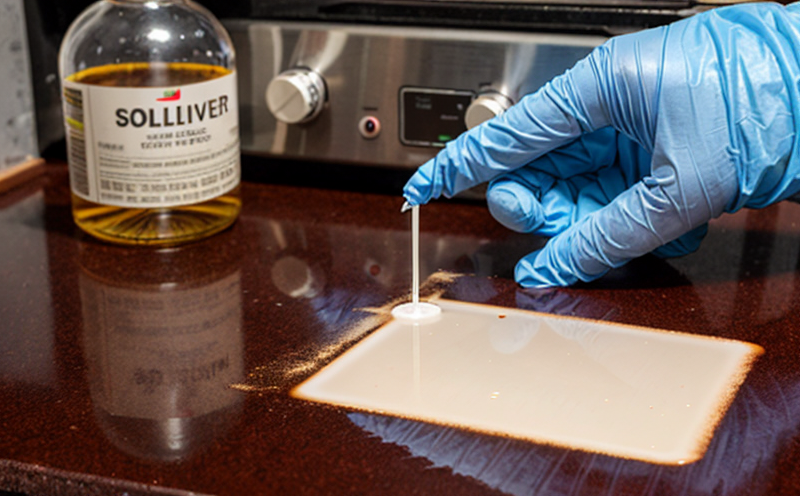Gasoline Solvent Residue Testing
Gasoline solvent residue testing is a critical process used to ensure that gasoline products meet regulatory standards and quality specifications. This test assesses the amount of residual solvents left in gasoline after distillation, which can indicate the presence of unwanted additives or impurities. The importance of this testing cannot be overstated, as even small amounts of certain solvents can affect engine performance, fuel efficiency, and emissions.
The primary goal of solvent residue testing is to determine whether there are any unintended compounds left in gasoline after production processes. These residues can include benzene, toluene, ethylbenzene, and xylenes (BTEX), which are known carcinogens or have other adverse health effects when present in high concentrations. Regulatory bodies such as the Environmental Protection Agency (EPA) and the International Organization for Standardization (ISO) set strict limits on these compounds.
The testing process involves several key steps, including sample preparation, analysis using gas chromatography, and interpretation of results. Sample preparation typically requires a precise dilution ratio to ensure accurate measurement. Once prepared, the sample undergoes gas chromatographic analysis to separate and quantify individual components. The resulting data is then compared against established standards to determine compliance.
Understanding the context within which this testing occurs highlights its significance in various sectors. For instance, in the automotive industry, gasoline quality directly impacts vehicle performance and emissions. In environmental protection, ensuring proper gasoline composition helps minimize pollution from volatile organic compounds (VOCs). Regulatory bodies like OSHA and the EPA enforce these standards to protect public health.
The acceptance criteria for gasoline solvent residue testing are based on international standards such as ASTM D975-18 and ISO 4284. These guidelines specify permissible levels of residual solvents in gasoline, which must not exceed certain thresholds. Any deviations from these limits can lead to significant issues, including reduced fuel efficiency, increased emissions, and potential engine damage.
Proper instrumentation is crucial for accurate solvent residue testing. Chromatographic instruments designed specifically for this purpose offer high sensitivity and precision, allowing for precise quantification of even trace amounts of solvents. The choice of instrument can vary depending on the specific requirements of the test, but modern gas chromatographs equipped with thermal conductivity detectors (TCD) or flame ionization detectors (FID) are commonly used.
The importance of this testing extends beyond mere compliance; it also plays a vital role in R&D efforts aimed at improving fuel formulations. By identifying and quantifying residual solvents, researchers can refine production processes to eliminate unwanted compounds while maintaining optimal performance characteristics. This not only enhances product quality but also contributes to more environmentally friendly manufacturing practices.
Customer satisfaction is paramount when it comes to solvent residue testing services. Our laboratory ensures that every test is conducted with the highest level of accuracy and reliability, using state-of-the-art equipment and experienced personnel. Compliance officers and R&D engineers can trust our results to meet stringent regulatory requirements and support ongoing product development.
Understanding the industry applications and use cases underscores the relevance and necessity of this testing in various sectors. In the automotive industry, ensuring gasoline quality is essential for maintaining engine performance and emissions compliance. For environmental protection agencies, accurate solvent residue testing helps monitor and mitigate potential pollution risks associated with volatile organic compounds (VOCs).
Industry Applications
| Industry | Description of Application |
|---|---|
| Automotive | Ensuring gasoline meets performance and emissions standards. |
| Environmental Protection Agencies | Mitigating pollution risks from volatile organic compounds. |
| R&D Laboratories | Supporting product development and quality control. |
| Procurement Departments | Evaluating supplier compliance with regulatory standards.
The automotive industry relies heavily on accurate solvent residue testing to ensure that gasoline meets performance and emissions standards. Environmental protection agencies use this testing to monitor and mitigate potential pollution risks from volatile organic compounds (VOCs). R&D laboratories leverage these tests to support product development and quality control, while procurement departments evaluate supplier compliance with regulatory standards.
Customer Impact and Satisfaction
Our laboratory prides itself on delivering accurate and reliable results that exceed customer expectations. We understand the importance of timely and precise testing in maintaining compliance and ensuring product quality. Our experienced team ensures that every test is conducted with the highest level of accuracy, using state-of-the-art equipment and methodologies.
The impact of our services extends beyond mere compliance; it contributes to the overall satisfaction of our customers by providing them with valuable insights into their products' performance and potential areas for improvement. We work closely with quality managers, compliance officers, R&D engineers, and procurement specialists to tailor our services to meet their specific needs.
Our commitment to excellence is reflected in the satisfaction rates of our clients. We consistently receive positive feedback from customers who appreciate the accuracy and reliability of our results. By partnering with us, organizations can trust that they are receiving the best available testing solutions for their gasoline solvent residue requirements.
Use Cases and Application Examples
| Use Case | Description of Example |
|---|---|
| Quality Control | Testing gasoline samples to ensure compliance with regulatory standards. |
| R&D Support | Identifying and quantifying residual solvents in new fuel formulations. |
| Emissions Testing | Monitoring the presence of volatile organic compounds (VOCs) in exhaust emissions. |
| Supplier Evaluation | Evaluating supplier compliance with established gasoline specifications. |
The following are some common use cases and application examples that highlight the importance of gasoline solvent residue testing:
- Quality control: Testing gasoline samples to ensure compliance with regulatory standards.
- R&D support: Identifying and quantifying residual solvents in new fuel formulations.
- Emissions testing: Monitoring the presence of volatile organic compounds (VOCs) in exhaust emissions.
- Supplier evaluation: Evaluating supplier compliance with established gasoline specifications.
In each case, accurate solvent residue testing is crucial for maintaining product quality and ensuring regulatory compliance. Our laboratory offers comprehensive testing services that cater to these diverse needs, providing clients with the insights they need to make informed decisions about their products.





